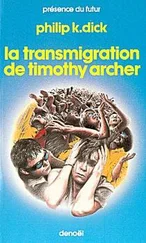Philip Dick - The Transmigration of Timothy Archer
Здесь есть возможность читать онлайн «Philip Dick - The Transmigration of Timothy Archer» весь текст электронной книги совершенно бесплатно (целиком полную версию без сокращений). В некоторых случаях можно слушать аудио, скачать через торрент в формате fb2 и присутствует краткое содержание. Жанр: Фантастика и фэнтези, на английском языке. Описание произведения, (предисловие) а так же отзывы посетителей доступны на портале библиотеки ЛибКат.
- Название:The Transmigration of Timothy Archer
- Автор:
- Жанр:
- Год:неизвестен
- ISBN:нет данных
- Рейтинг книги:4 / 5. Голосов: 1
-
Избранное:Добавить в избранное
- Отзывы:
-
Ваша оценка:
- 80
- 1
- 2
- 3
- 4
- 5
The Transmigration of Timothy Archer: краткое содержание, описание и аннотация
Предлагаем к чтению аннотацию, описание, краткое содержание или предисловие (зависит от того, что написал сам автор книги «The Transmigration of Timothy Archer»). Если вы не нашли необходимую информацию о книге — напишите в комментариях, мы постараемся отыскать её.
The Transmigration of Timothy Archer — читать онлайн бесплатно полную книгу (весь текст) целиком
Ниже представлен текст книги, разбитый по страницам. Система сохранения места последней прочитанной страницы, позволяет с удобством читать онлайн бесплатно книгу «The Transmigration of Timothy Archer», без необходимости каждый раз заново искать на чём Вы остановились. Поставьте закладку, и сможете в любой момент перейти на страницу, на которой закончили чтение.
Интервал:
Закладка:
That was my faulty motivation, my wish. I wanted to keep on seeing them. And so I arranged to collude and knew that I was colluding. I decided that day in the St. Francis; I kept my mouth shut and my opinions to myself and I agreed to log the expected phenomena, and so I came to be a part of something that I knew was silly. Bishop Archer wrecked his career and not once did I try to talk him out of it. After all, I had tried to talk him out of his affair with Kirsten, to no avail. This time, he would not merely out-argue me; he would drop me. The cost, to me, would be too great.
I did not share their fixed idea. But I did as they did and talked as they talked. I'm mentioned in Bishop Archer's book; he gives me credit for "invaluable assistance" in "noting and recording the day-to-day manifestations of Jeff," of which there were none. I guess this is how the world is run: by weakness. It all goes back to Yeats' poem where he speaks of "the best lack all conviction" or however he phrases it. You know the poem; I don't have to quote it to you.
"When you shoot at a king you must kill him." When you plan to tell a world-famous man that he is a fool, you must face the fact that you will lose what you cannot bring yourself to lose. So I kept my fucking mouth shut, drank my drink, paid for my drink and Kirsten's, accepted the presents she had brought me from London, and promised to watch for fast- breaking phenomena, for all new developments.
And I would do it again, if I had the opportunity, because I loved the two of them very much, both Kirsten and Tim. I loved them far more than I cared about my own probity. Friendship loomed large; the importance of probity-hence, probity itself-dwindled and at last vanished entirely. I said good-bye to my integrity and kept my friendships alive. Somebody else will have to judge if I did the right thing, for I am still not disinterested; I still see only two friends, just returned from months abroad, friends I had longed for, especially with Jeff dead ... friends I could not survive without, and, deep inside me, a subtle factor urged me on, a factor I did not admit to that day; I took pride in the fact that I knew a man who had marched with Dr. King at Selma, a famous man whom David Frost interviewed, whose opinions helped shape the modem intellectual world. There you have it, the essence of it. I defined myself to myself-my identity-in terms of being Bishop Archer's daughter-in-law and friend.
This is an evil motivation and it pinned me; it had me caught fast. "I know Bishop Timothy Archer," my mind uttered to itself in the darkness of the night. It whispered these words to me, bolstering my self-esteem; I, too, felt guilt over Jeff's suicide, and by participating in the life and times, the customs and habits of Bishop Archer, I lost my own self-doubts-or, at least, felt them diminish.
But there is a logical error in my reasoning-as well as an ethical one-and I had not perceived it; through his credulity and superstitious folly, the Bishop of California intended to barter away his influence, his power to control public opinion, the very power that drew me to him. Had I been able to timebind adequately that day at the St. Francis, I would have foreseen this-and done differently. He would not long be a great man; he connived to transform himself from authority to crank. Thus, much of what drew me to him would soon vanish. So, in this respect, I stood in as deluded a state as he. This failed to register on my mind that day. I saw him only as he was then, not as he would be in a few years. I, too, was operating at a six-year- old level. I did not do any real harm, but I did not do any real good, and I debased myself really for nothing; no good came out of it, and when I look back I long bitterly for the insight I have now, long to have had it then. BishopArcher swept us along with him because we loved him and believed in him, even when we knew he was wrong, and this is a terrible realization, a matter that should incite moral and spiritual dread. It does that, in me, now; but it did not then; my dread came too late; it came as hindsight.
This may be tiresome prattle to you, but it is something else to me: it is my heart's despair.
8
THE AUTHORITIES DID NOT keep Bill Lundborg in jail long. Bishop Archer arranged for his release-based on Bill's history of chronic mental illness-and presently a day came when the boy showed up at their apartment in the Tenderloin, wearing a wool sweater Kirsten had knitted for him, and his baggy pants, his pudgy face bland.
It personally gladdened me to see him. I had thought about him a number of times, wondering how he was doing. Jail did not seem to have done him any harm. Perhaps he did not distinguish it from his periodic confinements in the hospital. For all I knew, not that much difference existed; I had been confined in neither.
"Hi, Angel," he said to me as I entered the apartment; I had been forced to move my new Honda to keep from getting a ticket. "What is that you're driving?"
"A Honda Civic," I said.
"That's a good engine in that," Bill said. "It doesn't over rev like most mills that small. And it's sprung well. Do you have the four-speed or the five?"
"Four." I took off my coat and hung it in the hall closet.
"For that short a wheel-base, it rides really good," Bill said. "But on impact-if an American car hits you-you'd be wiped out. You'd probably roll."
He told me, then, the statistics on fatalities in single-car accidents. It presented a gloomy picture insofar as small foreign cars were concerned. My chances were nothing like, say, with a Mustang. Bill spoke with enthusiasm about the new front-wheel drive Oldsmobile, which he depicted as a major engineering advance in terms of traction and road-handling. It was evident that he believed I should get a larger car; he exhibited concern for my safety. I found this touching, and, moreover, he knew what he was talking about. I had lost two friends to a single-car accident involving a VW Beetle, the rear wheels of which had cambered in, causing the car to roll. Bill explained that that design had been successfully modified, starting in 1965; after that, VW utilized a fixed rather than swing axle. It limited toe-in.
I think I have these terms right. I am dependent on Bill for this kind of information about cars. Kirsten listened with apathy; Bishop Archer revealed at least simulated attention, although I had the impression that this was a pose. It seemed impossible to me that he either cared or understood; for the bishop such matters as toe-in were as metaphysical matters are to the rest of us: mere speculation, and a frivolous one at that.
When Bill disappeared into the kitchen for a can of Coors, Kirsten's lips formed into a word directed at me.
"What?" I said, cupping my ear.
"Obsession." She nodded solemnly and with distaste.
Returning with the beer, Bill said, "Your life depends on the suspension of your car. A transversal torsion-bar suspension provides-"
"If I hear anything more about cars," Kirsten interrupted, "I am going to begin shrieking."
"Sorry," Bill said.
"Bill," Bishop Archer said, "if I were to buy a new car, what car should I get?"
"How much money-"
"I have the money," the bishop said.
"A BMW," Bill said. "Or a Mercedes-Benz. One advantage with a Mercedes-Benz is that nobody can steal it." He explained, then, about the astoundingly sophisticated locks on the Mercedes-Benz. "Even car repossessors have trouble getting into them," he finished. "A thief can rip off six Caddies and three Porsches in the time it takes to get into a Mercedes-Benz. So they tend to leave them alone; that way, you can leave your stereo in the car. Otherwise, with any other car, you have to lug it around with you." He told us, then, that it had been Carl Benz who had engineered and built the first practical automobile propelled by an internal combustion engine. In 1928 Benz had merged his company with Daimler-Motoren- Gesellschaft to form Daimler-Benz from which had come the Mercedes-Benz cars. The name "Mercedes" was that of a little girl whom Carl Benz had known, but Bill could not remember if Mercedes had been Benz's daughter, grandchild or what.
Читать дальшеИнтервал:
Закладка:
Похожие книги на «The Transmigration of Timothy Archer»
Представляем Вашему вниманию похожие книги на «The Transmigration of Timothy Archer» списком для выбора. Мы отобрали схожую по названию и смыслу литературу в надежде предоставить читателям больше вариантов отыскать новые, интересные, ещё непрочитанные произведения.
Обсуждение, отзывы о книге «The Transmigration of Timothy Archer» и просто собственные мнения читателей. Оставьте ваши комментарии, напишите, что Вы думаете о произведении, его смысле или главных героях. Укажите что конкретно понравилось, а что нет, и почему Вы так считаете.










